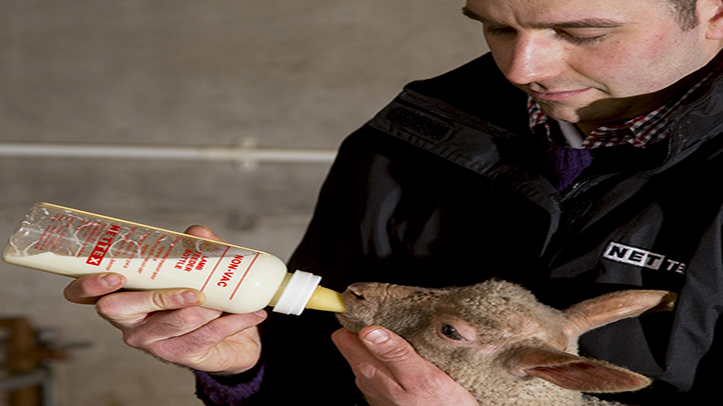Colostrum is critical to the short and long-term health of lambs, and a new guide from Nettex outlines how to supplement both ewe and powdered colostrum.
Thick, yellow and creamy, maternal colostrum is high in energy and protein to give newborn lambs a metabolic and immunity boost.
According to sheep farmer and product manager for Nettex, Emily Hall, the proteins in maternal colostrum include immunoglobulins, or antibodies. The most important is IgG, which circulates in the blood to protect against, and fight off, bacteria and viruses.
“Lambs have no circulating antibodies in their body when they are born. After the ingestion of sufficient quality and quantity of maternal colostrum, the level of antibodies circulating and the lamb’s immunity increases significantly. This is called passive immunity,” explained Ms Hall.
Because a ewe’s immune system will be producing antibodies against the pathogens present on the farm, her colostrum will be full of the required antibodies a lamb needs to be protected from those same pathogens.
Colostrum also provides lambs with a rich energy source to maintain their body temperature and bodily functions. Inside the ewe it is warm and everything is provided for them. Once born, they have to maintain their own body reserves and colostrum will help them do this.
According to Ms Hall, the majority of lamb deaths within the first 48 hours of life – which make up 49% of total lamb deaths – are a result of inadequate colostrum consumption. This is due to a lack of energy leading to hypothermia.
Using colostrum supplements
“Supplementation will almost certainly be required at some point over the lambing period, be that in the form of other ewes that have lambed at the same time or in the form of a replacer,” said Ms Hall.
While it is very common in triplet lambs, a study found 30% of twin bearing ewes and 10% of singles do not produce enough colostrum.
If maternal colostrum feeding has also been delayed, greater amounts will be required to ensure lambs absorb enough IgGs for passive immunity transfer.
“Where we see a huge demand for colostrum supplementation is when cold weather hits,” she added. “It is vital lambs receive enough colostrum to have the energy to reduce the risk of hypothermia.”
When supplementation is required, Ms Hall recommends feeding as much maternal colostrum as possible to give lambs pathogen fighting antibodies and topping up with a high quality, full fat colostrum supplement for energy.
“If you have multiples and are short on maternal colostrum, split the ewe’s colostrum between the lambs so they use antibodies for passive transfer and then fill the rest of their requirements with a colostrum supplement,” she advised.
Feeding frozen ewe colostrum
Because of the immunity value on-farm-produced antibodies give lambs, always opt for maternal colostrum from the flock when possible.
Feeding a colostrum powder
Since it is uncommon for farms to have an adequate supply of high quality ewe colostrum on hand for supplementation, Ms Hall recommends farmers have colostrum powder on hand.
“There are a lot of colostrum powders on the market that are going to vary in quality and source. Look for a colostrum supplement that closely mimics the ewe’s colostrum such as Nettex Ultra Concentrate Colostrum that has added ewe milk and egg proteins,” she said.
Colostrum powders should be full fat, contain vitamins and minerals, and be certified free from TB, Johnes and EBL. To be complementary to UK farms, look for colostrum that is developed from UK farms.
If a lamb has received very little maternal colostrum, then supplement it with a higher rate of colostrum powder of around 50g. If it has received some ewe colostrum, this rate can be pulled back to 25g, Ms Hall said.
She continued: “Whether lambs can get all of their colostrum from the ewe or if you are needing to supplement, it is essential for the short and long-term health of the lamb to ensure it is receiving adequate amounts of the right quality.”


